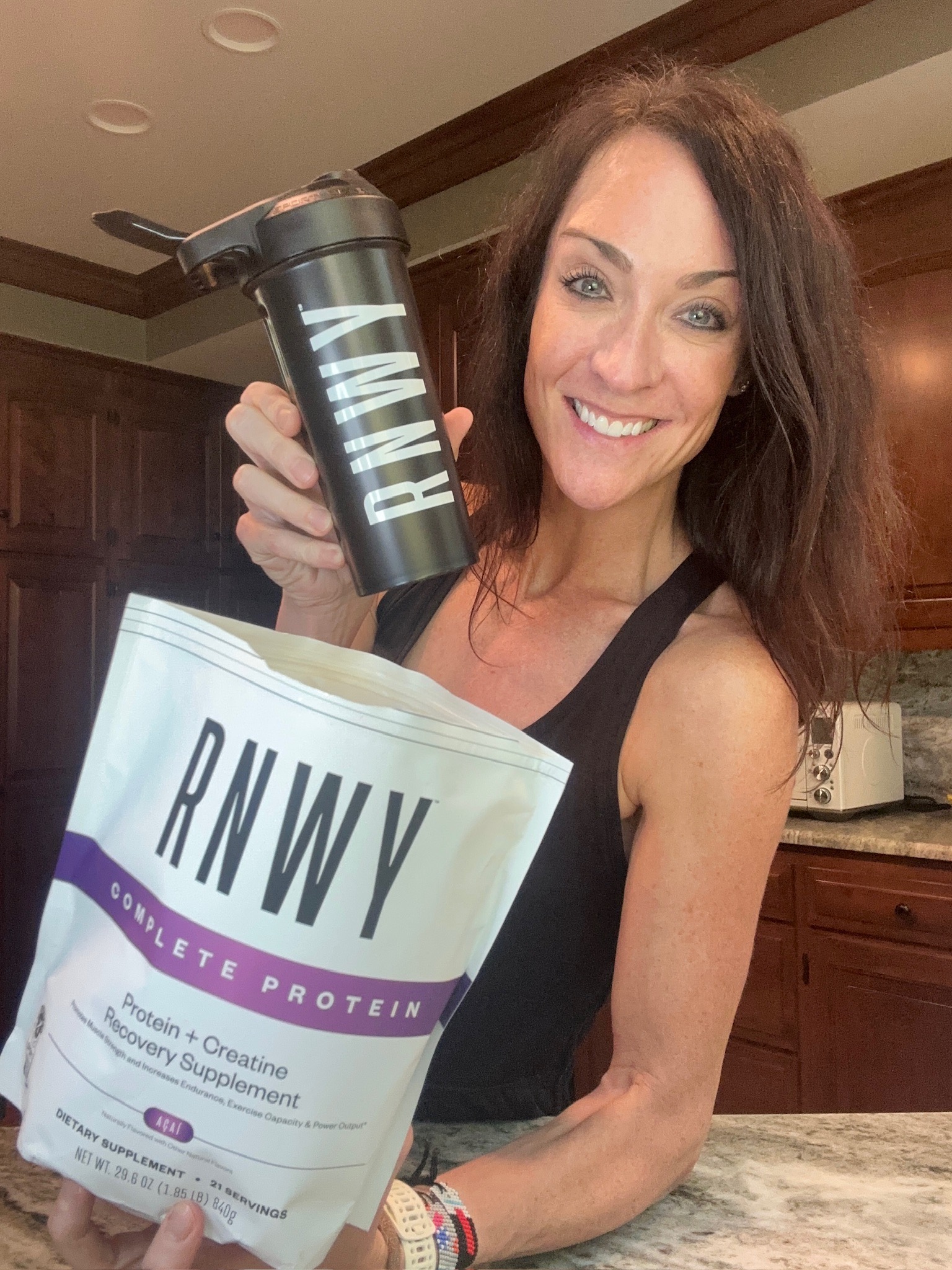This post is part of a paid sponsorship with RNWY.
Creatine supplementation is widely recognized in sports for its benefits in high-intensity, short-duration activities such as weightlifting, swimming, and sprinting. It is one of the most popular and well-researched supplements. Studies have consistently shown that creatine supplementation increases the intramuscular stores of creatine beyond what we can achieve through diet alone. <PMID: 28615996>
Recent research has also suggested potential advantages for endurance athletes. One of the most frequent questions is: Should I take creatine as an endurance runner? Let’s explore how creatine supplementation may benefit endurance runners, the science behind it all, and practical considerations for its use.
What is Creatine?
Creatine is a naturally occurring compound found in muscle cells, primarily as phosphocreatine. It plays a critical role in producing adenosine triphosphate (ATP), which is fast energy for cells. When you engage in short-duration, high-intensity activities, ATP is rapidly depleted, and phosphocreatine helps regenerate it, thus sustaining performance.
We consume creatine by eating foods rich in creatine, such as red meat, seafood and dairy. Since creatine is only found in animal tissues, vegans and some vegetarians may have lower levels of creatine stores. In order to fully saturate our muscle creatine stores, we need to supplement with something like RNWY Complete Protein – Protein + Creatine Recovery Supplement.
Benefits for Endurance Runners
The creatine phosphate energy system is utilized for quick, short bursts of intense activity. This energy system can create energy for up to 25 seconds. In the past, athletes who performed shorter bouts of exercise through weight lifting and sprinting were more likely to utilize creatine supplements.
However, in recent years, more endurance athletes have turned to creatine supplementation to improve their performance, recovery and mental health. However, the effects on endurance performance are less known. Let’s examine the research and discuss potential mechanisms of how creatine may impact endurance performance.
Improved Recovery: Creatine, due to its antioxidant and anti-inflammatory effects, has been shown to enhance muscle recovery post-exercise. This could mean reduced muscle soreness and quicker recovery between training sessions, leading to more significant fitness gains and better overall performance for endurance runners. <PMID:33800880>
Enhanced Muscle Glycogen Storage: Some studies suggest that creatine supplementation may increase the muscle’s ability to store glycogen. Glycogen is our muscle’s carbohydrate storage form, a key energy source during prolonged running. Improved glycogen storage can potentially enhance endurance. <PMID: 10444618> One study found that post-exhaustive endurance exercise participants stored more glycogen on a high-carb diet with the addition of creatine vs placebo. <PMID:27193231>
Improved Muscular Efficiency: In theory, creatine supplementation may lower the demand for oxygen consumption by working muscles during endurance performance. One study found a 4% reduction in oxygen consumption during heavy exercise when supplementing with creatine. <PMID: 12015375>
Hydration and Electrolyte Balance: Creatine helps retain water within muscle cells, which could benefit hydration status during endurance activities. Avoiding excessive dehydration is crucial for endurance performance and recovery. One study found that loading with 20 g of creatine for seven days induced a hyperhydration effect and allowed for more efficient thermoregulation in prolonged exercise in the heat. <PMID:15467102>
At this point, no research studies have evaluated the effectiveness of creatine supplementation on half marathon or marathon performance. However, as illustrated above, the potential for improvement in endurance running and marathon performances is plausible. Runners know that faster paces in track workouts, heavier lifting, greater lean muscle mass, and improved recovery could all benefit marathon performance on race day.
Recommended Dosage & Protocol
There are different approaches to taking creatine. Many strength and power athletes use the loading phase dose, followed by the maintenance dose. Many endurance athletes choose to take the maintenance dose daily. Others take a lower dose of 3 grams per day.
Loading Phase: For strength and power athletes, a loading phase of 20 grams per day (divided into 4 doses) for 5-7 days is typically recommended to rapidly saturate muscle creatine stores.
Maintenance Phase: Following the loading phase, a maintenance dose of 3-5 grams daily is commonly used. Research suggests endurance athletes skip the loading phase and go straight to the maintenance dose. Creatine stores can be saturated in 4 weeks with this approach. <PMID: 37096381>
Timing: Creatine can be taken at any time of day, though it may be most effective close to training. Consuming carbohydrates with creatine can enhance muscle uptake.
Considerations & Potential Side Effects
Weight Gain: Creatine supplementation can lead to weight gain due to increased muscle water retention. This is most often seen when using the Loading Phase dose of creatine and may not be experienced with the lower Maintenance Phase dose.
Digestive Issues: Some individuals experience gastrointestinal discomfort when taking creatine. Starting with a lower dose and gradually increasing it can minimize these issues. <PMID: 18373286>
Individual Response: Some people respond to creatine supplementation in different ways. While many athletes see benefits, some may experience little changes in endurance performance. This may be associated with genetics, as athletes with more fast twitch muscle fibers responded to creatine. Those with lower baseline muscle creatine content also responded better to creatine supplementation. <PMID: 15320650>
Quality and Purity: Choose high-quality creatine monohydrate to ensure safety and effectiveness. Choosing products that are NSF Certified for Sport or Informed Sport certified helps ensure we are getting a high-quality, verified product.
Vegan and Vegetarian Athletes: Given that creatine is consumed via animal and marine proteins, populations who avoid or limit these food sources may benefit from creatine supplementation. Creatine supplementation in vegetarians increases total creatine concentrations in muscle and increased lean muscle mass, strength, and endurance in one study. However, studies are mixed if creatine supplementation benefits vegetarian and vegan athletes more than omnivorous athletes. <PMID: 32349356>
Discussion & Conclusion
Creatine supplementation offers promising benefits for endurance runners, including improved recovery, enhanced glycogen storage, and potentially increased muscular efficiency.
Further research is warranted to determine if creatine supplementation can enhance in-race pace changes and surges, in other words, higher-intensity bouts of running in a marathon. The interplay between carbohydrates and creatine is also exciting and needs further research, but the takeaway here is adequate carbohydrates plus creatine augment recovery and glycogen storage. It’s also important to note that there is individual variability in response to creatine supplementation, so it’s recommended that we practice supplementation in the off-season.
By understanding the science behind creatine and following recommended usage guidelines, endurance athletes can make informed decisions about incorporating this supplement into their training regimen. Consulting with a healthcare provider or a sports dietitian can help tailor supplementation to your individual needs and goals.
This educational blog post is sponsored by RNWY, a sports performance brand dedicated to supporting your athletic journey. Running isn’t just an activity. It’s our shared passion. It’s a lifestyle. It’s a relentless pursuit of improvement. Together, we’re on a mission to fuel your journey.
Try the new RNWY Complete Protein – Protein + Creatine Recovery Supplement. With 25 g of protein and 5 g of creatine per serving, you can recover and give the above benefits of creatine a try. Available in chocolate & acai flavors. Use code Feathers15 for 15% off your order at RNWY.life.

Disclaimer: The content in our blog articles provides generalized nutrition guidance. The information above may not apply to everyone. For personalized recommendations, please reach out to your sports dietitian. Individuals who may chose to implement nutrition changes agree that Featherstone Nutrition is not responsible for any injury, damage or loss related to those changes or participation.


This is the blog I’ve been waiting for. Thank you so much!
I do have a question. I was warned before hand that some people don’t respond to it. And I think I might be one of them. If it’s helped, it is subtle to the point where I have no idea if it’s working or not.
I’ve been doing the maintenance dose for 6 months.
So I guess I’m wondering, is there anything I can to do to confirm I respond to it and if I’m one of those people are there still “non-result” benefits of continuing to take it?
If you don’t notice any benefits (muscle recovery, lean muscle mass gains from improved lifting, etc), I don’t think there is a reason to continue.
You are a remarkable communicator. This post gives more better info quicker than anyone.
Thank you for this.
Even endurance atheletes need to metabolize lactate… throught the Cori Cycle.
Isn’t Creatine’s enhanced resynthesis of ATP an aid to this?
It’s sad to see you pimping products on your website and fuel for the sole now.
The podcast was *amazing* but now it’s really hard to trust anything now that you take so many nutrition/supplement sponsors 🙁
I hope you reconsider your sponsorship agreements!
We are very selective on our sponsorship deals, and we will only make deals with brands that we use ourselves and can honestly recommend to our athletes and followers. We have built some great relationships with some awesome brands who are truly helping athletes to fuel & feel their best. Also, this allows us to continue to provide tons of free resources to our followers.
Wow Max, your comment is in poor form and (sorry) kinda ignorant. There is a firehose of free to the consumer great content made available through sponsorships with relational integrity. That is just a fact.
Pointing us towards a product that has proven helpful is such a small fraction of time and as much an expression of hopeful kindness as anything else.
Max, You might leave that comment someplace on the internet, but I think it just doesn’t fit here.
Thanks so much for always sharing high quality products with us and empowering us by teaching us how to read ingredients and certifications on labels. You’re a GEM and I love this space and community you’ve created through your competence, warmth and authenticity!
Your blog posts are always SO CLEAR and concise and provide all the information I’m looking for. I know you don’t endorse a product unless you have thoroughly researched it and are confident it supports the needs of endurance athletes. I’m excited to try the RNWY Complete Protein and can’t thank you enough for providing all this info. I love how you provide recommendations for maintenance vs. loading phases – exactly the information I needed. Thank you so much for continuing to provide high-quality, science-backed nutrition information for the running community! 🙂